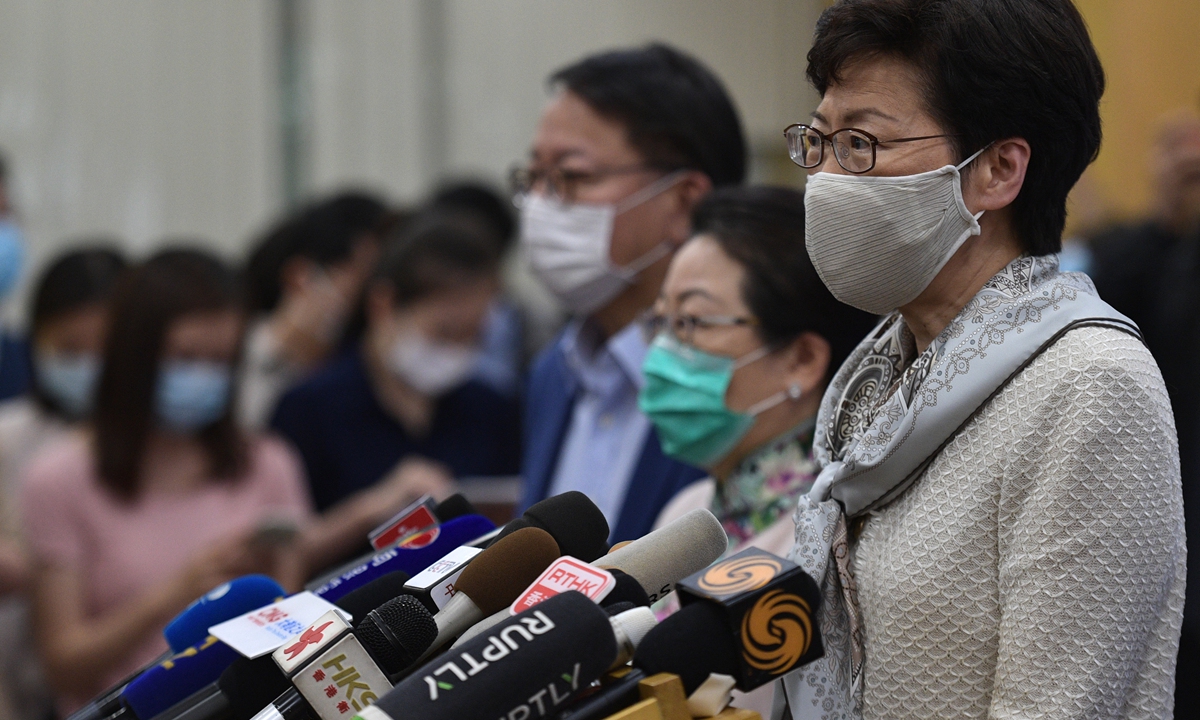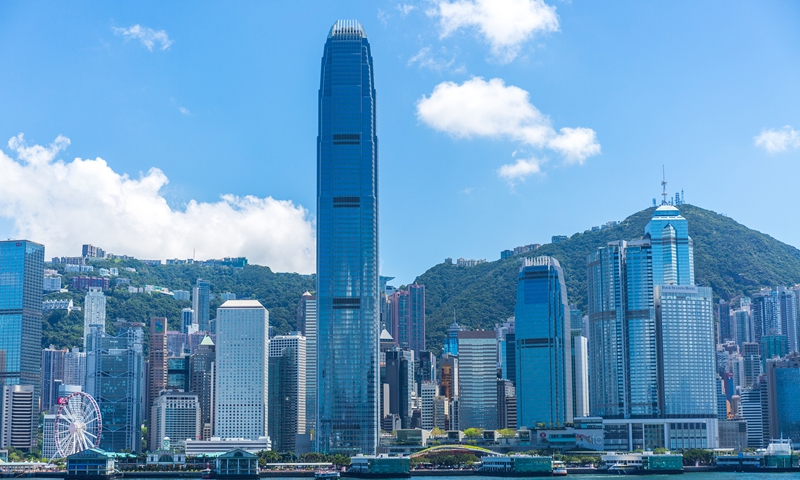US sanctions won't impact HK: Lam
By Yang Sheng and Chen Qingqing Source:Global Times Published: 2020/6/3 21:48:40
UK meddling in HK affairs could have ‘serious consequences’

Hong Kong's Chief Executive Carrie Lam speaks during a briefing at the Hong Kong Special Administrative Region office during her visit in Beijing on Wednesday. She said she is committed to fully supporting and pushing forward the formulation of the national security law and she condemned the US and the UK for their double standards on the issue. Photo: AFP
The UK is closely following the US with further actions to meddle in China's national security legislation for HKSAR, and the UK foreign secretary even called on China to "step back from the brink" by threatening to form an international alliance to pressure China on Hong Kong affairs. The Chinese Foreign Ministry responded, "We also advise the British side to step back from the brink."
Lam arrived in Beijing together with Secretary of Justice Teresa Cheng, Commissioner of the Hong Kong Police Force Chris Tang and Secretary for Security John Lee on Tuesday, and met with Chinese Vice Premier Han Zheng and other senior officials of the central government, including State Councilor and Minister of Public Security Zhao Kezhi, and Director of the Hong Kong and Macao Affairs Office of the State Council Xia Baolong on Wednesday.
Han is now the head of the Central Leading Group on Hong Kong and Macao Affairs, and Zhao is the deputy head of the group. The Xinhua News Agency reported this is the first formal appearance of the group.
After the meeting, Lam held a press conference at the Office of the HKSAR Government in Beijing with other senior Hong Kong officials, and said that "the meeting lasted three hours," during which Vice Premier Han pointed out the law won't affect the legitimate rights of the majority of Hong Kong people, as it only targets a very few people, behavior and activities endangering national security.
From May 21 to 22, Lam went to Beijing for the "two sessions." Within two weeks, Lam returned to Beijing with major officials from the Hong Kong Disciplinary Services。 She claimed that both the HKSAR government and the central government won't be intimidated by growing external pressure.
"I hope other countries would respect China's firm stance on the matter, and won't take unilateral measures that would lead to a negative influence," Lam said in response to pressures from countries like the US and the UK over the national security legislation for Hong Kong.
Despite external pressures, the pace of formulating and enacting the national security law would further accelerate given the active attitude of the HKSAR government, Li Xiaobing, an expert on Hong Kong affairs at Nankai University in Tianjin, told the Global Times on Wednesday.
"The meeting with senior central government officials also served as an opportunity to report public sentiment from Hong Kong, including those from the legal profession and other sectors, on this law to the top authority," Li said, noting that as the law would be introduced to Hong Kong through Annex III of the Basic Law, it also requires a full-fledged and dynamic coordination between central and local authorities.
China's sovereignty issue is now being undermined in Hong Kong as forces advocating separatism and even terrorism are on the rise in HKSAR. The central government has no other alternative but to take stringent action to safeguard the "one country" of the "one country, two systems" policy, Lam said.
Some foreign governments have been adopting latent double standards when dealing with and commenting on the national security legislation, Lam said.
"It is within the legitimate jurisdiction of any country to enact the law. The US is no exception, and the UK is no exception," Lam said, asking why they oppose the legislation and even threatened to impose sanctions on the HKSAR and the People's Republic of China for taking similar action.
Chinese mainland analysts said the Trump administration is ordering military and police forces to handle the nationwide riots in the US and even conduct law enforcement brutally, which led to casualties to protesters and the police. This is far worse than Hong Kong police's handling of the 2019 turmoil. So, the US and its allies are now even more unqualified and less convincing to make any comment on Hong Kong.
"The special status of Hong Kong comes from the Basic Law, including the independent tariff zone, free port and global financial center. And the US sanctions, such as revoking its special treatment of Hong Kong, which gives the city favorable trade, won't have any impact on the HKSAR," Lam said at the press briefing.
UK gets drunk
Apart from the US, the UK is now making a new move to further interfere in China's national security legislation for Hong Kong. In a joint letter to Prime Minister Boris Johnson, a cross-party group of seven former foreign secretaries says that the UK government "must be seen to lead the international response" as China pushes for the national security legislation, BBC reported on Monday.
The former cabinet members expressed their concern at what they call China's "flagrant breach" of Sino-British agreements, according to BBC. They urged Johnson to set up an "international contact group" of allies to coordinate any joint action, similar to that set up in 1994 to try to end the conflicts in the former Yugoslavia.
Li Haidong, a professor at the Institute of International Relations of the China Foreign Affairs University, told the Global Times on Wednesday that these UK politicians are making a serious mistake, as it seems like they are still living in their old dream of a Great British Empire.
"China is much more powerful and united than the former Yugoslavia, and the West today is far weaker and less influential than it was in the 1990s, so if they use the approach for the Balkans in the 1990s to interfere in China's internal affairs, they will definitely receive disastrous and unbearable retaliation," he said.
Many Chinese web users also mocked the move by UK politicians. "After Brexit, London is getting more and more drunk. It seems like they are addicted to the illusion of the 'empire on which the sun never sets'," read one comment that received hundreds of likes on guancha.cn, a Chinese news website.
A Downing Street spokesman insisted that the UK government was already playing a leading role with international partners in urging China to "think again."
Li Haidong said that after Brexit, the UK has decided to stand closer with the US under the Trump administration, so this time those UK politicians wanted to show how important they are to their biggest ally. He added that the UK has many hidden interests in Hong Kong, including intelligence, finance, and business. It can even intervene in the HKSAR's jurisdiction as it has special influence over the city's legal system.
"If China finalized the national security legislation for the HKSAR, many of these hidden interests will disappear, and the UK and the US can no longer use Hong Kong to challenge and influence the Chinese mainland, and they will also be unable to conduct activities in the city to harm China's national security," Li Haidong said, " This is why they are getting nervous.".

Hong Kong File Photo: VCG
Step back from the brinkA spokesperson from the Chinese Embassy to Britain said on Tuesday that China expresses grave concern about and strong opposition to such flagrant interference in Hong Kong affairs, which are China's internal affairs.
"We urge the relevant UK politicians to accept the fact that Hong Kong is now part of China, to observe the principle of noninterference in other country's internal affairs, and to stop meddling in Hong Kong affairs, which are China's internal affairs, in any form," said the spokesperson.
UK Foreign Secretary Dominic Raab said, "The UK would not turn a blind eye." He also said the new security legislation "very clearly violates" the autonomy that is guaranteed under Chinese law as well as that in the 1997 agreement, BBC reported on Monday.
Chinese Foreign Ministry spokesperson Zhao Lijian said on Wednesday, "China expresses strong dissatisfaction with this and firmly opposes it. We have made solemn representations to the British side."
The Sino-British Joint Declaration does not contain any words or clauses that entrust the UK with any responsibility for Hong Kong after its return to China in 1997, and the UK has "no sovereignty, governance or supervision over the returned Hong Kong," Zhao said.
Therefore, the British side has no right to use the "Sino-British Joint Statement" to make irresponsible remarks on Hong Kong affairs and interfere in China's internal affairs, he remarked.
Raab confirmed that the UK will allow those who hold British National (Overseas) (BNO) passports to come to the UK and apply to study and work for an extendable 12-month period.
On this matter, the Chinese Embassy spokesperson said the UK had explicitly pledged in an MOU exchanged with China that BNO passport holders who are Chinese citizens residing in Hong Kong will not have the right of abode in the UK.
"If the UK is bent on changing this unilaterally, it will not only go against its own position and promise, but also violate international law and the basic norms governing international relations," the Chinese Embassy spokesperson said.
On the impact that the national security law will have on Hong Kong, Zhao said that the law only targeted very few acts that seriously endanger China's national security and will not affect Hong Kong's high degree of autonomy.
"Neither the rights and freedoms of Hong Kong residents nor the legitimate rights and interests of foreign investors in Hong Kong will be affected. The law is conducive to the better implementation of the 'one country, two systems' policy and to Hong Kong's prosperity and stability," Zhao noted.
Raab said the UK's plan to build an international alliance is aimed at forcing China to "step back from the brink."
Zhao responded, "We also advise the British side to step back from the brink, abandon its Cold War and colonial mentality, recognize and respect the fact that Hong Kong has returned to and is an SAR of China, abide by the basic principles of international law and international relations, and immediately stop interfering in Hong Kong affairs and China's internal affairs. Otherwise, the UK will lift the stone and hit its own feet."
Posted in: POLITICS